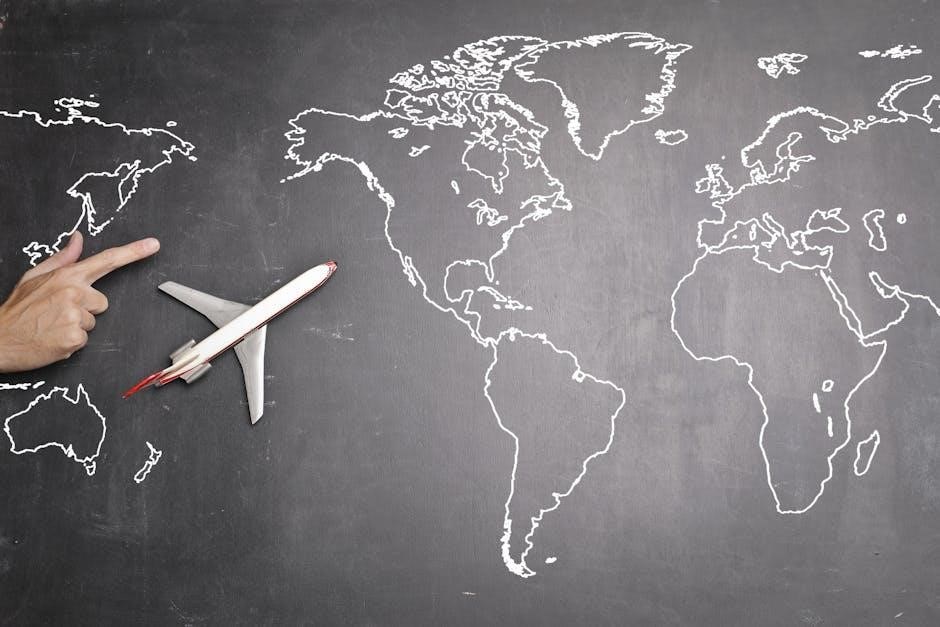Sex tourism involves traveling to engage in sexual activities, often in countries where prostitution is legal. It is a global phenomenon with significant cultural and economic implications.
1.1 Defining Sex Tourism and Its Global Phenomenon
Sex tourism is a form of travel explicitly aimed at engaging in sexual activities, often involving commercial sex services. It is a widespread global phenomenon, driven by varying legal frameworks, cultural attitudes, and economic factors. While some countries legalize and regulate prostitution, others-condemn it, creating a complex landscape. The industry raises ethical concerns, particularly regarding exploitation and human rights, making it a contentious yet significant aspect of modern tourism.
1.2 Historical Context and Cultural Perspectives
Sex tourism has deep historical roots, often tied to colonialism and economic disparities. Culturally, some societies embrace sexual liberation, while others condemn it. Countries like Thailand and the Philippines have long been destinations, blending tourism with commercial sex. Cultural attitudes vary widely, influencing both demand and supply. Ethical concerns, particularly exploitation, have shaped global perceptions, making it a complex issue intertwined with history and culture.

Legal Landscapes and Regulations
Prostitution laws vary globally, with some countries legalizing it. Travelers must understand local regulations and international prosecution risks, especially regarding child exploitation.
2.1 Countries Where Prostitution is Legal and Regulated
Prostitution is legal and regulated in countries like Thailand, the Netherlands, Germany, Nevada (USA), and New Zealand. These nations enforce strict regulations, including health checks and licensing, to ensure legality and safety. Travelers should research local laws to avoid illegal activities and understand the cultural and legal frameworks governing sex work in these destinations.
2.2 International Laws and Prosecution Risks
International laws target sexual exploitation, especially involving minors. Many countries prosecute their citizens for engaging in illegal sexual activities abroad, even if such acts are legal in the destination country. NGOs and global organizations work to combat exploitation, emphasizing legal accountability and ethical practices for travelers. Understanding these risks is crucial for responsible and lawful travel.
Safety and Health Considerations
Safety and health are critical when engaging in sex tourism. Prioritize personal hygiene, use protection, and stay informed about local scams to minimize risks and ensure well-being.
3.1 Personal Hygiene and Disease Prevention
Practicing strict personal hygiene is essential to prevent sexually transmitted infections (STIs). Always use protection, ensure vaccinations are up-to-date, and avoid risky behaviors. Regular health check-ups before and after travel are crucial. Be aware of local healthcare access and carry necessary medications. Avoiding unprotected interactions and maintaining cleanliness can significantly reduce health risks associated with sex tourism.
3.2 Avoiding Scams and Ensuring Safety
To avoid scams, research destinations thoroughly and understand local laws. Be cautious of misleading advertisements and unverified services. Trustworthy establishments often have reviews or certifications. Carry emergency contacts and stay informed about local customs. Ensure personal belongings are secure and avoid sharing sensitive information. Prioritize venues with good reputations to minimize risks and ensure a safer experience during your travels.

Ethical and Responsible Travel
Engage with local cultures respectfully and support NGOs fighting exploitation. Make informed choices to ensure your actions align with ethical standards and promote positive societal impacts.
4.1 Understanding Ethical Implications
Sex tourism raises significant ethical concerns, including exploitation, human rights violations, and cultural insensitivity. Travelers must consider the societal and moral impacts of their actions, ensuring they do not contribute to harm. Understanding local norms and supporting ethical practices helps promote responsible engagement and minimizes negative consequences for vulnerable populations.
4.2 Supporting NGOs Fighting Exploitation
NGOs play a vital role in combating exploitation linked to sex tourism. Organizations like Equality Now and The Code of Conduct work to protect vulnerable individuals and prevent trafficking. Travelers can support these efforts through donations, volunteering, or spreading awareness. Engaging with ethical tourism practices and advocating for victims’ rights helps create a safer, more just environment for all.
Popular Destinations for Sex Tourism
Thailand, known for its vibrant nightlife and red-light districts, is a major destination. Other global hotspots include the Philippines, Mexico, and Cambodia, each offering unique experiences.
5.1 Thailand: The Red-Light Districts and Nightlife
Thailand is renowned for its vibrant nightlife and red-light districts, particularly in cities like Bangkok, Pattaya, and Phuket. Popular spots include Soi Cowboy, Nana Plaza, and Walking Street, offering diverse entertainment. The country’s liberal attitude toward sexuality attracts global visitors, blending cultural experiences with modern nightlife, making it a central hub for sex tourism in Southeast Asia.
5.2 Other Global Hotspots and Their Unique Features
Besides Thailand, countries like the Netherlands, Germany, and Brazil are known for their liberal attitudes. The Netherlands offers regulated brothels, while Germany boasts high-class establishments. Latin American destinations like Mexico and Costa Rica provide vibrant nightlife and diverse cultural experiences, attracting tourists seeking unique entertainment and relaxation in exotic settings.
Cultural and Societal Dynamics
Cultural attitudes toward sexuality and societal norms significantly influence sex tourism. Regions with more permissive views attract tourists seeking sexual experiences, while strict laws and norms deter them.
6.1 Attitudes Toward Sexuality and Prostitution
Cultural and societal attitudes toward sexuality and prostitution vary widely, shaping the demand for sex tourism. In some regions, liberal views on sexuality normalize commercial sex, while others condemn it due to religious or moral beliefs. These differing perspectives influence both the legality and societal acceptance of prostitution, creating diverse environments for sex tourism to thrive or be suppressed.
6.2 Local Laws and Social Norms
Local laws and social norms significantly influence sex tourism dynamics. In some regions, prostitution is legal and regulated, while others enforce strict penalties, even for tourists. Societal norms often dictate the visibility and acceptance of commercial sex, with some cultures tolerating it openly and others condemning it. Understanding these factors is crucial for navigating destinations responsibly and avoiding legal or social conflicts.
Economic Impact of Sex Tourism
Sex tourism significantly contributes to local economies, boosting income for hotels, transportation, and entertainment. However, it often fuels exploitation, undermining efforts to combat human trafficking and abuse.
7.1 Contribution to Local Economies
Sex tourism generates significant revenue for local economies, supporting industries like hospitality, transportation, and entertainment. Hotels, bars, and clubs benefit from increased demand, creating jobs and stimulating economic activity. However, this income often comes at a cost, as it can perpetuate exploitation and fuel illegal activities such as human trafficking, undermining efforts to address social and ethical concerns.
7.2 The Dark Side: Sex Trafficking and Exploitation
Sex tourism often masks severe exploitation, with many individuals forced into the industry through trafficking. Vulnerable populations, including children, are disproportionately affected. NGOs like Equality Now and The Code work to combat these abuses, advocating for legal reforms and awareness campaigns. Tourists must recognize the ethical implications of their actions and support efforts to protect exploited individuals and promote accountability.

Travel Formalities and Precautions
Researching destinations and understanding local laws is crucial. Ensure valid travel documents and awareness of restrictions. Precautions include verifying safety protocols and respecting cultural norms to avoid legal issues.
8.1 Researching Destinations in Advance
Researching destinations is critical to ensure compliance with local laws and cultural norms. Understanding legal frameworks, health guidelines, and societal attitudes helps travelers make informed decisions. Using reputable sources and staying updated on local conditions ensures safety and avoids legal risks. Advance research also highlights NGOs and initiatives combating exploitation, promoting ethical and responsible travel practices.
8.2 Understanding Travel Documents and Restrictions
Understanding travel documents and restrictions is vital for smooth journeys. Ensure passports and visas are valid, and familiarize yourself with entry requirements. Some destinations may impose restrictions based on sexual orientation or marital status. Researching these details helps avoid legal complications during travel.
Violating local laws, even unknowingly, can lead to deportation or legal consequences. Always consult official government sources for the most accurate and up-to-date information.
Role of NGOs and International Organizations
NGOs and international organizations play a crucial role in combating exploitation through legal advocacy and awareness campaigns, ensuring ethical tourism practices globally.
9.1 The Code of Conduct for Tourism Companies
The Code of Conduct for Tourism Companies is a set of guidelines aimed at preventing the sexual exploitation of children in the travel industry. Companies that join this initiative gain access to tools and resources to ensure ethical practices. NGOs play a crucial role in supporting and monitoring these efforts, helping to create a safer environment for vulnerable populations worldwide.
9.2 Global Initiatives to Prevent Child Exploitation
Global initiatives, led by NGOs and international organizations, aim to combat child exploitation in tourism. Programs like Equality Now and The Code of Conduct work to raise awareness and prevent sexual exploitation. These efforts include educating travelers, collaborating with governments, and enforcing stricter laws. Awareness campaigns and legal advocacy are critical in protecting vulnerable children and promoting ethical travel practices worldwide.

Health and Wellness for Travelers
Sexual health awareness is crucial for travelers. NGOs provide resources to prevent STIs and ensure access to medical services abroad, promoting safe and informed travel practices.
10.1 Sexual Health Awareness
Sexual health awareness is critical for travelers engaging in sex tourism. Understanding STI prevention, using protection, and accessing medical services abroad are vital. Travelers should stay informed about local healthcare options and carry necessary precautions. NGOs and health organizations often provide resources to promote safe practices and ensure access to care, reducing risks associated with sexual activities while traveling.
10.2 Access to Medical Services Abroad
Access to medical services abroad is crucial for travelers, especially when engaging in sexual activities. Research local healthcare options and ensure travel insurance covers medical emergencies. Carry essential medications and know nearby clinics. NGOs often provide guidance on health services. Stay informed about local healthcare quality, as it varies widely. Preparation is key to handling unexpected medical situations while traveling.
Sex tourism is a complex issue requiring reflection on ethics, legality, and personal responsibility. Informed decisions ensure safe and respectful experiences for all parties involved globally.
11.1 Making Informed and Responsible Choices
Making informed decisions is crucial for ethical and safe engagement in sex tourism. Research destinations thoroughly, understanding local laws and cultural norms. Prioritize consent, legal compliance, and health safety to ensure responsible experiences. Supporting NGOs and respecting communities helps combat exploitation and promotes sustainable tourism practices. Always choose destinations with regulated systems to minimize risks and contribute positively to local economies while upholding ethical standards.
11.2 The Future of Sex Tourism and Ethical Travel
The future of sex tourism lies in balancing sustainability with ethical practices. As travelers increasingly prioritize responsible tourism, the industry must adapt by promoting regulated environments and combating exploitation. NGOs and governments are collaborating to enforce stricter laws and raise awareness. Ethical travel initiatives aim to ensure that tourism benefits local communities without perpetuating harm, fostering a more equitable and conscientious approach to global travel.

Be First to Comment